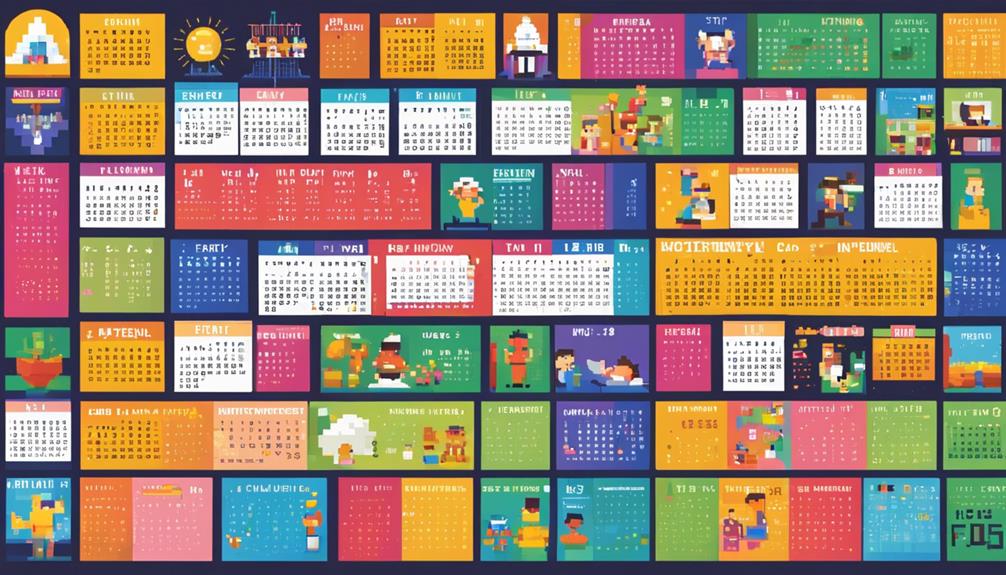Self-Improvement Month is in September, inspired by milestones like 'How to Win Friends and Influence People'. It's a time for setting achievable goals, trying new hobbies, and embracing positive changes for personal growth. Activities like exercise and volunteering boost overall well-being. Habit formation during this month enhances progress in personal and professional life, leading to increased productivity and career advancement. Starting with clear goals and small changes in routines can establish lasting habits. Consistency and accountability play key roles in habit building. Learn more about the impact and benefits of Self-Improvement Month.
Key Takeaways
- Self-Improvement Month is observed in September.
- Established to celebrate achievements and encourage personal growth.
- Focus on setting achievable goals and exploring new hobbies.
- Embrace positive changes and cultivate healthy habits.
- Recognized nationwide since the 1980s for self-improvement initiatives.
Self-Improvement Month Timeline
In tracing the evolution of Self-Improvement Month, significant milestones in the history of personal development have emerged.
It all began back in October 1936 when Dale Carnegie published 'How to Win Friends and Influence People,' a classic self-help book that laid the foundation for the self-improvement movement.
In August 1958, Dr. Joyce Brothers started a TV show focusing on personal development, bringing these concepts into the mainstream media.
Fast forward to February 29, 1960, the birthdate of Tony Robbins, a prominent figure in self-improvement whose work has inspired countless individuals to read self-help books and attend motivational seminars.
These key moments in history have contributed to the growth and awareness of personal development practices, leading to the establishment of Self-Improvement Month.
Ways to Observe Self-Improvement Month

To observe Self-Improvement Month, consider engaging in activities like:
- Setting achievable goals
- Exploring new hobbies
- Reading self-help books that inspire growth
By establishing new habits during this month, you can experience the numerous benefits of habit formation, such as:
- Increased productivity
- Enhanced focus
- Improved overall well-being
Embracing the opportunity to cultivate positive changes through self-improvement can pave the way for long-lasting personal development and success.
Self-Improvement Month Activities
Engage in a variety of activities during Self-Improvement Month to enhance personal growth and development. Here are some ways to improve oneself through activities:
- Adopt healthy habits such as regular exercise, balanced nutrition, and sufficient sleep. These habits contribute to your overall well-being and can boost your energy levels.
- Volunteer your time and skills to help others in need. Giving back to the community not only benefits those you assist but also brings a sense of fulfillment and purpose to your life.
- Engage in self-reflection through journaling or meditation. Taking time to introspect allows you to understand your thoughts and emotions better, leading to personal insights and growth.
Benefits of Habit Formation
Explore how forming new habits can greatly enhance your Self-Improvement Month experience and contribute to your personal growth journey. Habit formation is a powerful tool that can lead to significant progress in both your personal and professional life during this month dedicated to self-improvement. By consistently practicing new behaviors, you can cultivate positive routines that promote overall well-being and fulfillment.
Research suggests that it takes time, typically between 18 and 254 days, to establish a habit. This underscores the importance of perseverance and repetition in the process of habit formation. Motivation, available resources, and self-regulation also play vital roles in building habits, highlighting the need for accountability measures such as having a buddy or seeking coaching support.
Establishing New Habits
Consider incorporating small changes into your daily routine to establish new habits during Self-Improvement Month in September. Forming new habits consciously can combat feelings of boredom and depression.
To make the most out of this month, try the following:
- Start with a Self-Improvement Book: Reading self-improvement books can provide valuable insights and inspiration to kickstart your journey towards establishing new habits. Choose a book that resonates with you and aligns with your personal growth goals.
- Set Clear Goals: Define specific and achievable goals that you want to work on during Self-Improvement Month. Having clear objectives in mind can help you stay focused and motivated to establish new habits effectively.
- Track Your Progress: Keep a journal or use an app to track your progress as you work on establishing new habits. Monitoring your daily activities and reflecting on your achievements can reinforce positive behaviors and encourage consistency.
Self-Improvement Facts and Figures

The self-improvement industry in the U.S. is a profitable $10.4 billion market, with a strong focus on producing content that caters to both men and women. One of the most popular self-help books, 'Men Are from Mars, Women Are from Venus,' has resonated with many seeking personal growth. Interestingly, women constitute a larger portion of the self-improvement market, showing a strong interest in enhancing their lives. Publishers are enthusiastic about creating self-help materials to meet this demand, ensuring a wide array of resources are available for individuals looking to improve themselves.
Moreover, the industry thrives not only through books but also on the speaker circuit, where experts share their knowledge and insights with eager audiences. This support system plays a vital role in guiding individuals on their self-improvement journeys. The significant investment in self-improvement reflects a societal shift towards personal development and well-being, showcasing the importance placed on growth and fulfillment.
Importance of Self-Improvement Month

Embrace September as a month dedicated to personal growth and self-enhancement through Self-Improvement Month. This period serves as a valuable opportunity for you to focus on your development and well-being.
During Self-Improvement Month, consider the following:
- Effort to Improve: Dedicate time and energy towards bettering yourself. Whether it's picking up a new hobby, addressing a bad habit, or learning a new skill, your commitment to improvement sets the foundation for growth.
- Achievable Goals: Set realistic and attainable objectives for yourself. By breaking down larger aspirations into smaller, manageable steps, you can make steady progress and stay motivated throughout the month.
- Seeking Guidance: Utilize the wealth of resources available to support your journey. Libraries, bookstores, online blogs, and courses offer valuable insights and tools to aid you in your self-improvement endeavors.
Making a New Habit

To enhance your self-improvement journey during Self-Improvement Month in September, concentrate on establishing a new habit that aligns with your personal growth goals.
When aiming to form a new habit, it's crucial to recognize that studies suggest it can take anywhere between 18 and 254 days to establish it. Consistency and repetition play a vital role in making this new habit automatic in your daily routine. Factors like motives, available resources, and self-regulation also affect how successfully you can develop this habit.
For a smoother progression, consider implementing accountability systems such as having a buddy or coach to support you in maintaining this new habit. These external support systems can help keep you on track and motivated.
Definition of a Habit

A habit is a behavior that you do automatically, whether intentionally or not. It helps you efficiently navigate through your daily routines by processing information effortlessly.
Understanding how habits form and the factors influencing them will be essential in your journey towards self-improvement.
Automatic Behavior Definition
Forming through repetition and consistency, a habit is an automatic behavior that can be deliberately or unintentionally developed. Habits play a vital role in efficiently processing large amounts of information in your daily life. They can range from simple routines like brushing your teeth to more complex behaviors like driving a car.
Here are some key points to understand about automatic behaviors:
- Efficiency: Habits help streamline your daily tasks, freeing up mental space for other activities.
- Durability: Some habits formed in childhood can persist into adulthood and may require conscious effort to change.
- Formation: Creating new habits demands intentional repetition and consistency over an extended period, typically ranging from 18 to 254 days.
Understanding the nature of habits can empower you to cultivate positive behaviors intentionally and break free from ones that no longer serve you.
Forming New Habits
Developing a new habit involves creating an automatic behavior that can process information efficiently. To form a new habit, you need to learn something repeatedly until it becomes ingrained in your routine. Studies show that it can take anywhere from 18 to 254 days of consistent practice to solidify a new habit. Consistency and gradual progression are vital during this learning process. To help you better understand the process of habit formation, let's explore the key elements involved in creating a new habit:
| Element | Description | Importance |
|---|---|---|
| Repetition | Repeating the behavior consistently over time to make it automatic. | Crucial for habit formation |
| Cue | A trigger that initiates the habit, linking it to a specific context or time. | Helps in remembering to perform the habit |
| Reward | A positive outcome or feeling associated with completing the habit. | Reinforces the habit loop |
| Environment | The surroundings and conditions that support or hinder habit formation. | Can influence habit consistency |
Understanding these elements can guide you in forming new habits successfully.
Factors Influencing Habit Formation
Understanding the factors that influence habit formation is essential for effectively establishing new behaviors. Habits can be intentionally or unintentionally formed, taking anywhere from 18 to 254 days to solidify. Motives, resources, and self-regulation all play a role in habit formation, along with environmental, social, and biological factors.
Consistency and repetition are key in habit formation, as they create neural connections in the brain for automatic behavior.
Accountability systems, like having a buddy or coach, can help maintain new habits and increase long-term success.
Creating new habits can lead to personal and professional growth, combat boredom and depression, and bring excitement and enjoyment to life.
Creating New Habits

To establish new habits successfully, focus on consistency and repetition as key elements in your daily routine. When creating a new habit, ensuring to take the necessary steps consistently over a period of time is crucial. Studies show that it can take anywhere from 18 to 254 days for a new habit to become ingrained in your routine.
To increase the likelihood of success, consider pairing your new habit with related activities that you already do regularly. This can help integrate the habit more seamlessly into your daily life. Additionally, factors like your motives, available resources, and self-regulation play a role in shaping habit formation.
If you find it challenging to stick to your new habit alone, consider implementing accountability systems such as having a buddy or a coach to support and motivate you along the way. By staying committed and following through with your new habit consistently, you can increase the chances of it becoming a permanent part of your lifestyle.
Benefits of New Habits

Forming new habits can enhance both your personal and professional growth considerably. When you commit to improving yourself by incorporating new habits into your routine, you open up a world of benefits that can positively impact various aspects of your life.
Increased Productivity: By adopting new habits that streamline your workflow or daily tasks, you can improve your efficiency and get more done in less time.
Enhanced Well-being: Developing habits that focus on self-care, such as regular exercise or meditation, can significantly boost your overall health and mental well-being.
Career Advancement: Introducing habits like continuous learning or networking can propel your professional growth, opening up opportunities for advancement and success.
Why Self-Improvement Month Matters

Self-Improvement Month matters because it provides a dedicated time for individuals to focus on personal growth and development. In September, this observance aims to promote self-improvement by encouraging people to set goals, learn new skills, and make positive changes in their lives.
Since the 1980s, Self-Improvement Month has gained nationwide recognition, offering various resources to support individuals on their journey to self-betterment. It serves as a valuable reminder to reflect on your progress, celebrate achievements, and continuously push for personal growth.
Whether you're exploring new hobbies, setting SMART goals, or enhancing various aspects of your life, Self-Improvement Month provides a platform for you to invest in yourself. By dedicating time and effort to celebrate self-improvement during this month, you can propel yourself towards becoming the best version of yourself and achieving the goals you have set for personal development.
Frequently Asked Questions
What Month Is Self Improvement Month?
Self-Improvement Month falls in September. It's a time to focus on personal growth, set goals, and try new things. Libraries, online courses, and self-help books are great resources to support your self-improvement journey.
How Do You Take Time for Personal Growth?
To grow like a tree in a gentle breeze, you carve out moments daily. Read, learn, reflect. Set goals, seek mentors. Embrace challenges. Watch as each effort, big or small, shapes a better you.
How Do I Start My Self-Improvement?
Start your self-improvement journey by setting clear goals, exploring new opportunities, and tracking your progress. Learn new skills, read books, and practice self-care regularly. Celebrate achievements, reflect on your growth, and set healthy boundaries.
What Are Some Important Events or Activities During Self-Improvement Month?
During Self-Improvement Month, individuals can focus on various events and activities to enhance personal growth. Engaging in mindfulness meditation, attending self-improvement workshops, and practicing self-reflection are important truths about selfimprovement drive. These activities can help individuals develop a better understanding of themselves and work towards positive change.
Is There a Specific Month Dedicated to Self-Improvement?
There is no specific month dedicated to understanding selfimprovement obsession. However, many people use the start of a new year as an opportunity to set goals and make positive changes in their lives. Self-improvement is a lifelong journey and can be pursued at any time.
Conclusion
To sum up, Self-Improvement Month is a valuable opportunity to focus on personal growth and development. By setting goals, creating new habits, and prioritizing self-care, you can make lasting positive changes in your life.
Take the time this month to reflect on areas for improvement and commit to making small, consistent changes for a brighter future. Remember, self-improvement is a journey, not a destination.
Start today and watch yourself grow.










